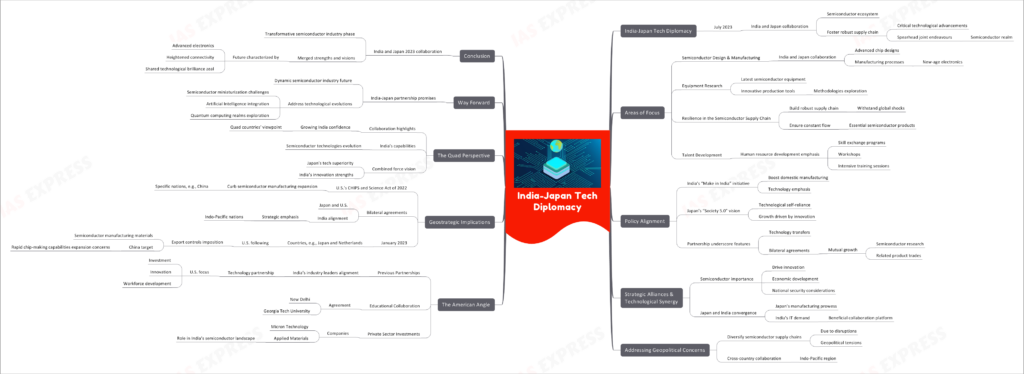India-Japan Tech Diplomacy- How Can it be Improved?

In July 2023, India and Japan embarked on a collaborative journey targeting the semiconductor ecosystem. This partnership was designed to foster a robust supply chain for critical technological advancements and to spearhead joint endeavours in the realm of semiconductors.

This topic of “India-Japan Tech Diplomacy- How Can it be Improved?” is important from the perspective of the UPSC IAS Examination, which falls under General Studies Portion.
Areas of Focus
Semiconductor Design & Manufacturing
- India and Japan are collaborating on:
- Advanced chip designs.
- Manufacturing processes tailored for new-age electronics.
Equipment Research
- Research on the latest semiconductor equipment.
- Exploration of innovative production tools and methodologies.
Resilience in the Semiconductor Supply Chain
- Aims to build a robust supply chain that can withstand global shocks.
- Ensures a constant and unobstructed flow of essential semiconductor products.
Talent Development
- Emphasis on human resource development.
- Skill exchange programs, workshops, and intensive training sessions.
Policy Alignment
- India’s “Make in India” initiative: Focused on boosting domestic manufacturing and technology.
- Japan’s “Society 5.0” vision: Prioritizes technological self-reliance and growth driven by innovation.
- The partnership underscores:
- Technology transfers.
- Bilateral agreements for mutual growth in semiconductor research and related product trades.
Strategic Alliances & Technological Synergy
- Recognizing the importance of semiconductors in:
- Driving innovation.
- Economic development.
- National security considerations.
- Convergence of Japan’s manufacturing prowess and India’s burgeoning IT demand creates a platform for beneficial collaboration.
Addressing Geopolitical Concerns
- Emphasis on diversifying semiconductor supply chains due to disruptions and geopolitical tensions.
- Importance of cross-country collaboration in the Indo-Pacific region.
The American Angle
Previous Partnerships
- India’s alignment with industry leaders is evident in its technology partnership with the U.S.
- Focus areas include investment, innovation, and workforce development.
Educational Collaboration
- An agreement is in the pipeline between New Delhi and Georgia Tech University.
Private Sector Investments
- Investments from companies like Micron Technology and Applied Materials play a pivotal role in India’s semiconductor landscape.
Geostrategic Implications
- U.S.’s CHIPS and Science Act of 2022 strategically curbs semiconductor manufacturing expansion in certain nations, including China.
- Both Japan and the U.S. have signed bilateral agreements with India, emphasizing the strategic alignment of these nations in the Indo-Pacific.
- In January 2023, countries like Japan and the Netherlands followed the U.S. in imposing export controls on semiconductor manufacturing materials to China, signifying global concerns over China’s rapidly expanding chip-making capabilities.
The Quad Perspective
- The collaboration highlights the growing confidence in India by Quad countries.
- Signifies India’s evolving capabilities in semiconductor technologies.
- Envisions a combined force of Japan’s tech superiority and India’s innovation strengths.
Way Forward
The ongoing partnership between India and Japan promises a dynamic future for the semiconductor industry. As technology continually evolves, collaborations will address:
- Semiconductor miniaturization challenges.
- Integration of Artificial Intelligence.
- Delving into quantum computing realms.
Collaborations like these will undoubtedly reshape the global technological landscape, impacting geopolitical partnerships and signaling a new dawn for the Indo-Pacific region.
Conclusion
The collaboration between India and Japan in 2023 marks a transformative phase in the semiconductor industry. By merging their strengths and visions, both nations are paving the path towards a future characterized by advanced electronics, heightened connectivity, and a shared zeal for technological brilliance.
Practice Question for Mains
Discuss the state of India-Japan tech diplomacy. How can it be strengthened going forward? (250 words)

